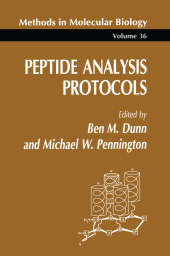 Neuerscheinungen 2013Stand: 2020-01-07 |
Schnellsuche
ISBN/Stichwort/Autor
|
Herderstraße 10
10625 Berlin
Tel.: 030 315 714 16
Fax 030 315 714 14
info@buchspektrum.de |

Ben M. Dunn, Michael W. Pennington
(Beteiligte)
Peptide Analysis Protocols
1994. 2013. xii, 335 S. 15 SW-Abb. 229 mm
Verlag/Jahr: SPRINGER, BERLIN; HUMANA PRESS 2013
ISBN: 1-489-94004-9 (1489940049)
Neue ISBN: 978-1-489-94004-9 (9781489940049)
Preis und Lieferzeit: Bitte klicken
As the technology base for the preparation of increasingly c- plex peptides has improved, the methods for their purification and ana- sis have also been improved and supplemented. Peptide science routinely utilizes tools and techniques that are common to organic chemistry, p- tein chemistry, biophysical chemistry, enzymology, pharmacology, and molecular biology. A fundamental understanding of each of these areas is essential for interpreting all of the data that a peptide scientist may see. The purpose of Peptide Analysis Protocols is to provide the novice with sufficient practical information necessary to begin developing useful analysis and separation skills. Understanding and developing these skills will ultimately yield a scientist with broadened knowledge and good problem-solving abilities. Although numerous books that address d- ferent specialties, such as HPLC, FAB-MS, CE, and NMR, have been written, until now no single volume has reviewed all of these techniques with a focus on "getting started" in separation and analysis of peptides. This volume will also provide those who already possess practical knowledge of the more advanced aspects of peptide science with detailed applications for each of these protocols. Because the chapters have been written by researchers active in each of the fields that they discuss, a great deal of information on and insight into solution of real problems that they have encountered is presented. Examplary results are clearly demonstrated and discussed. For more advanced investi- tions, supplementary experiments are often suggested.
Gel-Filtration Chromatography, Daniel M. Bollag. Ion-Exchange Chromatography, Daniel M. Bollag. Reversed-Phase HPLC: Analytical Procedure, Udo Nirenberg. Reversed-Phase High-Performance Liquid Chromatography: A Semipreparative Methodology, Michael E. Byrnes. Applications of Strong Cation-Exchange (SCX)-HPLC in Synthetic Peptide Analysis, Dan L. Crimmins. Principles and Practice of Peptide Analysis with Capillary Zone Electrophoresis, Thomas E. Wheat. Fast Atom Bombardment Mass Spectrometric Characterization of Peptides, P. R. Das and B. N. Pramanik. Sequence Analysis of Peptide Resins from Boc/Benzyl Solid-Phase Synthesis, Jan Pohl. NMR Spectroscopy of Peptides and Proteins, Mark G. Hinds and Raymond S. Norton. Techniques for Conjugation of Synthetic Peptides to Carrier Molecules, J. Mark Carter. Epitope Prediction Methods, J. Mark Carter. Epitope Mapping of a Protein Using the Geysen (PEPSCAN) Procedure, J. Mark Carter. Analysis of Proteinase Specificity by Studies of Peptide Substrates:The Use of UV and Fluorescence Spectroscopy to Quantitate Rates of Enzymatic Cleavage, Ben M. Dunn, Paula E. Scarborough, Ruth Davenport, and Wieslaw Swietnicki. Synthesis of Recombinant Peptides, Gino Van Heeke, Jay S. Stout, and Fred W. Wagner. De Novo Design of Proteins: Template-Assembled Synthetic Proteins (TASP), Gabriele Tuchscherer, Verena Steiner, Karl-Heinz Altmann, and Manfred Mutter. Chemical Synthesis of the Aspartic Proteinase from Human Immunodeficiency Virus (HIV), Paul D. Hoeprich, Jr. Multiple and Combinatorial Peptide Synthesis: Chemical Development and Biological Applications, Philip C. Andrews, Daniele M. Leonard, Wayne L. Cody, and Tomi K. Sawyer. Index.
...represent(s) excellent value for money, and are highly recommended. -The European Peptide Society Newsletter


